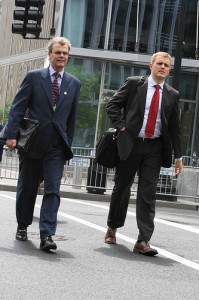 If you work in corporate America then there is a pretty good chance you might feel like you live at work. Working long hours to make a good impression has always been a common occurrence in the workplace. Over the past several years it has started to get out of control.
If you work in corporate America then there is a pretty good chance you might feel like you live at work. Working long hours to make a good impression has always been a common occurrence in the workplace. Over the past several years it has started to get out of control.
Last week, I read about a Bank of America intern who died after he had worked three straight days. While it is unknown what the real cause of death was, it is safe to say that this has brought a lot of attention to how much employees are being worked.
In an article from The Independent, which is a London news outlet, they had an anonymous quote from an investment banker saying that it was not uncommon for interns to work 100 or 110 hour work weeks. Interns have the unfortunate situation of being in one of the worst job markets in recent years. That causes the competition for each open position to be that much greater.
Imagine working until 3 or 4 in the morning and have a taxi take you home and wait for you to shower and change clothes before taking you back to the office for another day of work. What is known as the “magic roundabout” is said to be a common thing for a lot of investment banking interns.
Once upon a time, I worked for Bank of America and it wasn’t uncommon for me to be at the office at 7 or 7:30 in the morning and not leave for 12 or 14 hours. There was a night or two when we were closing a deal that my wife was in bed by the time I got home. It is exhausting to put your body through those kinds of hours.
Last year the BMJ medical journal published a study of over 2 million people who worked night shifts and excessive hours. They came to a conclusion that these individuals had a significantly increased risk of heart attack and stroke. Factoring in the lack of sleep and the stress that your body is under, it’s an obvious conclusion.
When it comes to the hours employees work, employers need to consider the law of diminishing returns. At what point in a person’s workday do they stop being productive or does productivity start to decrease? Does a person start losing focus at 6 hours? 8 hours? 10 hours?
This doesn’t just pertain to investment bankers, it is important for all industries. Truck drivers are required by law to stop driving after so many hours because it is not only dangerous to others on the road, but it is dangerous to them as well.
Once we can find the perfect point where the number of hours worked meets our optimal efficiency, it will cause businesses to run smoother and employees to be more content with their job.
Have you ever had a job where you worked an excessive amount of hours? Did you find you were as efficient in the first hour of the day as you were in the last?

I work a decent amount at my day job, and soon they want me working around the clock. UGH!
If blogging in bed counts then I live at work haha. I always made it clear to my employers that I was in a no BS mindset so since I am pretty productive when I do work, when the job is done I leave. Won’t spend an extra 2 hours on the web just to pretend that I worked late.
Ceteris paribus (huh, I’ve missed that phrase!) productivity tends to diminish as the hours increase. We are just human, we get tired and distracted. I’ve never had to work excessive hours at a job. Even with the minimal hours I do work I like taking breaks often, napping once in a while, excercising and staying hydrated. Productivity shoots up 🙂
I have had many jobs where I’ve worked crazy long hours. Most of it all had to do with making more money and that’s about it. Now that I’m in Canada I work what I need to and some overtime but I realized that I’m not going to kill myself to make an extra buck or two.
Yep, been there! Not quite as bit as you’ve explained, but still. Greg often worked 80 hour weeks and overnights at his old job. I would often work 50-60 hours per week when we were busy. Never again.
Not the least bit fun.
I am certainly fortunate to do work that I enjoy, and my career is at a point where I don’t have to work 60-80 hour weeks to sustain it. At this point, if a job started to demand that level of time commitment, I think that I would find a new employer
I agree completely